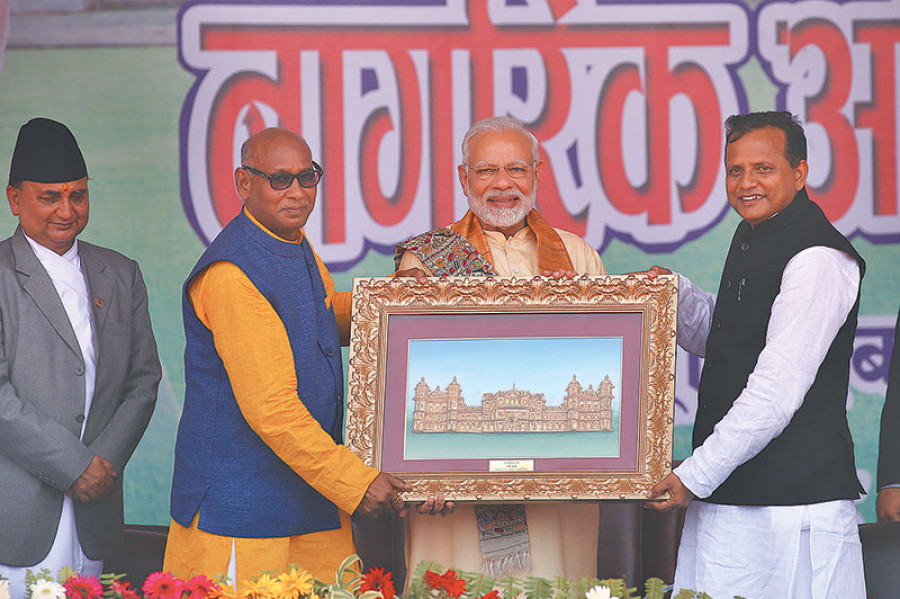Opinion
Connected through borders
Madhes should have used this as an opportunity to reveal its vision on how it seeks to engage with the Indian establishment
Kalpana Jha
Modi’s visit to Janakpur came at a time when a section of Madhesis clearly felt aggrieved with India. The newly elected leaders and representatives of Province 2 tried their best to make the Indian premier’s visit a remarkable one. At the same time mixed sentiments of the Madhesi population who felt that India’s role after the promulgation of constitution of Nepal in 2015 was at best betrayal for Madhesis was also apparent. While the grievances are genuine, it was also recognized that this visit was important in terms of making Madhes visible in the international arena.
Celebrated relationship
The relationship between Nepal and India is shaped by the special ties across the border and inevitably Madhesis remain at the helm of shaping this relationship. The border towns are almost indistinguishable because of common language and shared culture. The deep-bonds shaped by cross-border marriages also revered as the roti-beti relations is an undeniable reality that remain at the core of determining relationship of Nepal with India at large. Apart from the kinship ties, cross-border relationship is also defined by the everyday exchange of livelihood where millions of Nepalese depend on the open access for education, employment and medical treatment and much more.
It is thus important to highlight how open the borders are and how connected are the lives of the people on the borderlands, and the bonds they share. This visit has created an opportunity for Madhes to draw attention on these issues and re-define their relationship with India and forge a meaningful partnership. Multiple grand promises have come along this visit, too like in the past but the onus is, on Madhes to make the best of this opportunity and send across a timely reminder to India to commit to its promises which until date largely remain rhetorical. It is important for Madhes to draw attention of the Indian government as well as the Nepali government to the dilapidated infrastructure on both sides of the border which is a telling example of failure to cater to the promises made in the past.
Madhes should take on
While the Indian and Nepali media started highlighting mega projects such as Raxaul-Kathmandu railway connectivity, with the visit of Nepali premier KP Oli to India, Madhes ought to think and engage much strategically. For Madhes there are more pressing issues to be addressed. For instance, the issue of recurrent floods in Koshi that causes massive disaster in Madhes and Bihar each year should be of prime importance to the Madhesi leaders. Madhes should also prioritize improving cross-border connectivity as this will foster fruitful opportunities for trade and investment. Despite the fact that India has made multiple promises to Nepal to improve cross-border linkages, it has until date failed to deliver.
Grand projects such as Ramayana circuit can take its own time. There have been examples from the past where the delayed Janakpur-Ayodhya twin city agreement, the failed Sai-Krishna medical college has entailed more than just casual obstruction but deeply entrenched and unresolved issues that result from a lack of will from both countries. It is thus imperative that Madhes assumes a more significant role and prioritize projects pragmatically. For instance, the construction of the postal highway could provide an alternative lifeline to Madhes. Madhes thus has to assume much proactive role in such negotiations as they are the major stakeholders of these initiatives and worst sufferers of the catastrophe. Therefore, while a civic reception was a welcome gesture of hospitality, Madhes should have also used this as an opportunity to reveal its vision on how it seeks to engage with the Indian establishment now and in the future.
Although it is understood that in the given power structure there is not much that the provinces control in terms of decision making vis-à-vis foreign relations, Madhes holds a case unique. Madhes has to understand its own distinctive positioning in the new developments between the Nepali state and India. This is important from the perspective of constructing future diplomatic relations. In a new restructured Nepal, Madhes needs to determine its position in defining the future bilateral relations and India, too will have to recognize Madhes in the spirit of an indispensible factor in the future course of diplomatic relations with Nepal. Thus it is important for Madhes to unravel to the world how these normal appearing neighbors are not so normal and the open borders are defined by human bonds more than treaties inked on paper.
Meaningful engagement
The strength of this bilateral relationship is derived from people’s lived experiences, and is upheld by the power of a shared history. Thus people-to-people ties are at the core of defining this relationship. It comes from the special link forged by the family ties between Madhes and Bihar. It comes from the open border that entails no travel restrictions. Therefore a relationship carved in recognition to these facts will help develop a sustainable relationship between both the countries.
There are communities on both sides, sharing not only geographical proximity but socio-cultural, political and economic historical legacies. It is important to forge bonds based on them and most importantly to use these bonds to boost the relationship. These bonds have remained and will remain vital for both countries to pave way for achieving a mutually-beneficial bilateral partnership.
Therefore to envision a detached, formal, relationship limited to Kathmandu is to ignore the depth of what is shared at the borderlands. It is given that a cordial Kathmandu-Delhi relationship is unlikely by bypassing Madhes. It is crucial that India engages with Madhes meaningfully, in the future course of bilateral relationship. At the same time it is also important that Madhes determines how they view their own role in the future of India-Nepal relationship.
Jha is the author of The Madhesi Upsurge and the Contested Idea of Nepal




 19.12°C Kathmandu
19.12°C Kathmandu










